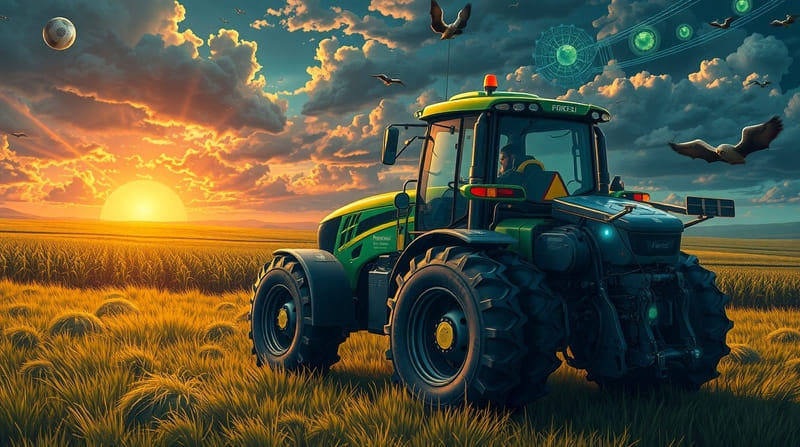I often found myself struggling to choose the right engine type for my farm tractors, weighing the benefits of diesel against the emerging alternatives. This decision can significantly impact efficiency, costs, and sustainability on your farm.
Diesel engines are widely regarded as the optimal choice for farm tractors, providing superior torque, fuel efficiency, and durability. While gasoline engines offer advantages in accessibility and maintenance, biofuels and electric engines are gaining traction for their sustainability and minimal emissions.
Selecting the right engine type for your farm tractors is fundamental to operational success. In this article, we will explore the characteristics of diesel, gasoline, biofuel, and electric engines, helping you make an informed choice based on your specific farming needs and regional considerations.
1. What Makes Diesel Engines the Best Choice for Farm Tractors?
Farmers face high fuel costs and machinery breakdowns which halt work. Reliable and efficient tractor engines are needed in tropical regions for a profitable farming business.
Diesel engines are best for farm tractors due to their strength, efficiency, and durability. They deliver great power and are cost-effective, offering reliable longevity.

Understanding Diesel Engines' Power in Agriculture
In agriculture, tractors are key as they handle many jobs like plowing and transporting loads. Diesel engines1 stand out due to their power, lasting nature, and fuel efficiency, making them perfect for farming uses.
High Torque Output at Low RPMs2
Diesel engines are well-known for high torque at low RPMs. This means they can pull heavy farm tools with ease. Even in tough terrain, these engines offer stable power, ensuring smooth field preparation. A friend manages a farm in Africa, where fields are uneven. He says his diesel tractor makes work manageable, even during challenging conditions.
Cost-Effective Fuel Consumption3
Fuel efficiency of diesel engines is vital in regions with high fuel prices. Better fuel consumption means lower operating costs for large tractors. Here's a simple table to show diesel costs compared to gas engines in a farming setup:
| Engine Type | Fuel Cost per Hour | Hours of Use per Week | Weekly Fuel Cost |
|---|---|---|---|
| Gas | $15 | 40 | $600 |
| Diesel | $10 | 40 | $400 |
Choosing diesel over gas offers savings of $200 weekly, a significant amount for farm businesses.
Durability for Long-Life Equipment
Durability is central when choosing farm equipment. Diesel engines have a simple and strong design, handling heavy use for many years. I recall an encounter with a farmer from Southeast Asia. His diesel-powered tractor has functioned well past the manufacturer's guaranteed lifespan. Such stories highlight the value of investing in diesel technology for long-term farming gains.
In summary, diesel engines are ideal for farm tractors. Their high torque at low RPMs provides the strength needed for demanding agricultural work. Plus, they offer fuel efficiency4, cutting costs in fuel-heavy operations. Their durability5 ensures tractors are reliable for years, a crucial quality for farmers striving for stability and success. Investing in diesel engines is a strategic decision for those aiming for efficient and sustainable farming in regions like South America, Oceania, Africa, and Southeast Asia.
Diesel engines provide high torque output at low RPMs, making them suitable for heavy farm tasks.True
Diesel engines are designed to deliver high torque, which allows them to effectively pull heavy farm implements even in challenging terrains.
Gas engines are more fuel-efficient than diesel engines for farm tractors.False
Gas engines generally have higher fuel costs per hour compared to diesel engines, making them less fuel-efficient for farming operations.
2. Why Consider Gasoline Engines for Tractors?
Limited access to diesel and technical difficulties in remote areas make choosing the right engine crucial. Switching to gasoline engines can be a solution if accessibility and maintenance are issues.
Gasoline engines in tractors offer practicality and reduced maintenance, making them ideal when diesel is scarce or when technical services are hard to reach. Their advantages lie in fuel availability and lower maintenance needs.

Accessibility of Gasoline
Gasoline is easy to find. It is present in both urban and rural regions across all continents. Diesel can be expensive, and it sometimes faces supply disruptions. For South America, Africa, Oceania, and Southeast Asia, access to gasoline6 is crucial. Many of these areas are remote. Supply chains can be difficult to maintain there.
With gasoline's broad availability, tractor operators do not worry about running out of fuel. Gasoline-powered tractors, therefore, become reliable assets for daily agricultural operations. In particular, they help farmers in regions where a steady diesel supply is not guaranteed. For instance, farmers on small islands or in remote villages in Southeast Asia might see gasoline as their only fuel option.
Low Maintenance Benefits7
Gasoline engines need less upkeep. Technical services are not always available in remote areas. Conducting complex diesel engine repairs in these areas is expensive and time-consuming. For context, imagine a farmer in the African savanna. If a diesel tractor breaks down, it could be weeks before a mechanic is available or parts arrive. Conversely, the simplicity of a gasoline engine allows for quicker fixes. Farmers can often perform minor maintenance themselves with minimal tools.
Here is a basic comparison to illustrate the maintenance factor:
| Feature | Gasoline Engine | Diesel Engine |
|---|---|---|
| Fuel Availability | High | Moderate to Low |
| Maintenance Complexity | Low | High |
| Self-Maintenance | Viable | Rarely Viable |
Farmers in regions with high labor costs or scarce technical expertise find these characteristics decisive. Gasoline engines require less technical knowledge. A farmer can replace spark plugs easily but might struggle with fuel injectors in a diesel engine. Keeping maintenance simple aids in maximizing tractor uptime8 and productivity, particularly during critical planting seasons.
Economic Implications
In terms of cost-benefit, gasoline engines are attractive. Initial investment and operational costs determine their practicality. Gasoline engines can be cheaper upfront. This is notable for farmers on tight budgets. In areas where agricultural income varies with seasonal rains, every financial saving counts.
In summary, gasoline engines9 offer major benefits to farmers in developing and tropical regions. Engine choice influences productivity and cost-effectiveness. For those with limited diesel access or where technical help is scarce, zoning in on gasoline engines is a strategic move.
Gasoline engines provide a low maintenance solution, making them ideal for remote areas.True
Gasoline engines require less technical expertise and simpler maintenance, making them suitable for farmers in locations with limited access to technical services.
Gasoline engines are more expensive than diesel engines in all agricultural settings.False
Gasoline engines often have a lower initial investment compared to diesel engines, particularly beneficial for farmers on tight budgets.
3. Can Biofuel Engines Truly Enhance Sustainable Farming Practices?
Farming often relies heavily on fossil fuels, causing environmental damage. This issue complicates efforts to be more eco-friendly. Biofuel engines offer a possible reduction in environmental impact.
Biofuel engines can use biodiesel, ethanol, or vegetable oil, reducing reliance on fossil fuels. They have the potential to decrease environmental harm and provide cost savings, especially for farmers who produce their own biofuels.

Understanding Biofuels
Biofuels have come into focus as viable alternatives to traditional fossil fuels. Biofuel engines can run on various types of fuels including biodiesel, ethanol10, and even vegetable oil. Let's consider what we mean when we talk about biofuels.
Types of Biofuels
- Biodiesel: Produced from animal fats, vegetable oils, or recycled greases. It's a renewable, biodegradable fuel.
- Ethanol: Made from fermenting plant materials like corn and sugarcane. It is commonly mixed with gasoline to reduce emissions.
- Vegetable Oil: This can be used directly in modified diesel engines and is typically sourced from crops grown specifically for fuel.
Impact on the Environment
Biofuels provide a greener source of energy. This is crucial in regions where eco-friendliness is becoming an essential selling point for agricultural businesses. By reducing reliance on fossil fuels, farming activities can become more sustainable. The reduction in carbon dioxide and other greenhouse gas emissions is significant when switching to biofuels.
Cost-Effectiveness for Farmers
Farmers often face tight budgets, and any cost savings can have a meaningful impact. Particularly in regions where agricultural waste is prevalent and biodiesel11 production is feasible, the use of biofuels can lead to substantial cost reductions.
Table: Potential Cost Benefits of Biofuel Engines
| Factor | Cost Impact |
|---|---|
| Indoor air quality | Less pollution |
| Engine maintenance | Prolonged engine life |
| Fuel production | Use of local materials |
| Waste management | Reduced waste |
Using biofuels allows farmers to create energy from their waste products. This not only reduces waste management difficulties but also provides a self-sustaining energy loop12.
Challenges and Considerations
While biofuels offer many benefits, there are challenges. The initial cost for engine conversion or replacement can be high. There are concerns about land usage, as diverting crops for fuel rather than food can have negative implications, particularly in food-insecure regions.
Conclusion: Future Prospects
Given these considerations, biofuel engines certainly provide an opportunity for more sustainable farming13. This is especially relevant in tropical and developing regions in South America, Oceania, Africa, and Southeast Asia. To truly capitalize on biofuels, farmers and businesses must weigh the initial investment against long-term gains in sustainability and cost-effectiveness. A shift towards biofuels from traditional fuels does promise a future of greener farming, aligning economic needs with environmental stewardship.
Biofuel engines can reduce reliance on fossil fuels in farming.True
Biofuel engines utilize alternatives like biodiesel and ethanol, which help decrease dependency on fossil fuels.
Biofuel engines cannot decrease environmental harm.False
In fact, biofuel engines are designed to reduce environmental impact by lowering emissions compared to traditional fossil fuels.
4. Are Electric Engines the Future of Tractors?
Farming faces pollution challenges. Electric engines offer a solution. Breakthrough technology resolves pressing agricultural problems.
Electric engines promise zero emissions and quiet operation. They can be charged via solar power, ensuring sustainability. Ease of maintenance reduces the need for technical expertise. They represent an emerging choice for innovative, eco-friendly farming.

Environmental Benefits of Electric Engines
Adoption of electric engines14 in agriculture offers tangible environmental benefits. They operate without emissions, combatting air pollution, a major agricultural concern. Electric tractors reduce the carbon footprint as they function without fossil fuels. This shift aligns well with global emission reduction targets. It supports sustainable farming practices, particularly in regions like South America and Oceania, which face environmental challenges due to traditional farming methods.
Consider the role of renewable energy15. Electric tractors charge using solar power16. This integration further enhances sustainability. Solar energy usage means lower operational costs. Farmers operate tractors under lower expenses. This advancement is crucial in areas where electricity costs are high or grid access is limited.
| Feature | Combustion Engines | Electric Engines |
|---|---|---|
| Emissions | High, CO2 emissions | Zero emissions |
| Noise | Loud operation | Quiet operation |
| Energy Source | Fossil fuels | Renewable energy (like solar) |
| Maintenance | Frequent, complex | Minimal, simpler |
Economic Impacts and Feasibility
Electric engines promise reduced maintenance. This is vital for farms with limited technical knowledge or resources. Combustion engines demand regular upkeep. They need oil changes, filter replacements, and more. Electric engines skip this costly maintenance. With fewer parts, they suffer fewer breakdowns. Owners save on repairs and downtime, enhancing productivity.
However, the initial investment in electric tractors may pose a hurdle. Costs are currently higher than traditional tractors. But as technology advances, prices are expected to fall. Government subsidies and incentives for eco-friendly equipment can prompt more farmers to switch. This policy support is essential, especially in developing regions where upfront costs might be prohibitive.
Encouraging Technological Adoption
Encouraging the use of electric engines17 involves education and advocacy. Farmers benefit from understanding long-term savings, environmental benefits, and operational efficiencies. Training programs can showcase how electric engines work. Demonstrations highlight their advantages over traditional engines.
Raising awareness is a collective effort. Agricultural stakeholders must collaborate. From government bodies to industry experts, promoting electric tractors helps broader adoption. It enhances food security, reduces environmental stress, and advances sustainable farming18.
As we look to the future, electric engines represent a revolution in farming technology. They hold the potential to transform agriculture into a more sustainable and economically viable industry. This shift not only supports today’s farmers but also protects future generations' livelihoods by fostering an environment-friendly agricultural landscape.
Electric engines for tractors produce zero emissions, making them environmentally friendly.True
Electric engines operate without emissions, which helps reduce air pollution and combat climate change.
Electric engines require more maintenance than combustion engines due to their complex systems.False
Electric engines have fewer parts and simpler systems, resulting in less maintenance compared to combustion engines that require frequent upkeep.
Conclusion
Choosing the right engine type for your farm tractor directly influences efficiency, sustainability, and costs. Diesel engines remain the top choice for power and durability, while gasoline engines offer accessible, low-maintenance options. Biofuel and electric engines present exciting paths toward greener farming. Each option has its place depending on regional needs and long-term goals. By understanding the strengths of each engine type, you can make informed decisions that support productivity and a sustainable agricultural future.
-
Explore the benefits of diesel engines in agriculture, including their power and efficiency, to understand their crucial role in farming operations. ↩
-
Learn how high torque output at low RPMs enhances the performance of agricultural machinery, making tasks easier and more efficient. ↩
-
Discover why cost-effective fuel consumption is essential for farmers, especially in areas with high fuel prices, to optimize their operations. ↩
-
Discover insights on fuel efficiency and its critical role in reducing operational costs for farmers, making it a must-read. ↩
-
Learn why durability is essential for farm equipment, ensuring reliability and long-term investment for farmers. ↩
-
Understanding the challenges of gasoline access can help improve supply chains and support farmers in remote regions. ↩
-
Learning about the maintenance benefits of gasoline engines can help farmers make informed decisions about their equipment choices. ↩
-
Learn effective strategies to keep tractors running smoothly, ensuring productivity during critical planting seasons. ↩
-
Explore how gasoline engines can enhance productivity and reduce costs for farmers, especially in developing regions. ↩
-
Learn about the production process of ethanol, a major biofuel, and its role in reducing emissions when mixed with gasoline. ↩
-
Explore the advantages of biodiesel, a key biofuel, and its impact on sustainability and cost savings for farmers. ↩
-
Learn about the concept of energy loops and how they can benefit agricultural practices through biofuel use. ↩
-
Discover insights on how biofuels contribute to sustainable farming practices and their impact on the environment. ↩
-
Explore how electric engines can transform agriculture by reducing emissions and promoting sustainability. ↩
-
Discover the synergy between renewable energy and electric tractors for sustainable farming practices. ↩
-
Learn about the cost savings and environmental benefits of solar power in agriculture. ↩
-
Explore the advantages of electric engines in farming, including cost savings and environmental benefits, to understand their transformative potential. ↩
-
Discover essential practices in sustainable farming that can enhance productivity and protect the environment, ensuring a better future for agriculture. ↩



